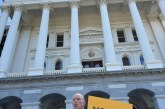

By David M. Greenwald
Executive Editor
Davis, CA – From my vantage point, the council is set to decide on what to do about the “Rubric” this week. The reality is that the structure of Measure J is such that it will make it difficult to plan because (a) much of the housing we are going to need in the next ten years is going to require a Measure J vote, and (b) the principles of good planning are not necessarily what will get the votes at the ballot box to approve a project—if anything can get approved at all.
So why are we dealing with a side issue when the main issue is whether to: (A) continue Measure J as is, (B) modify it, or (C) end it?
Given that Measure D (the extension of Measure J until 2030) passed with 83 percent of the vote, I don’t see the political support or the political will from the council to even seriously contemplate ending it.
That means that council should be deliberating over whether to continue Measure J as is or modify it. And of course, if we are to modify it, what that will look like.
For some, even the discussion of modification is seen as a threat.
As Eileen Samitz put it in a comment yesterday: “It is not Measure J/R/D which is broken and needs fixing, but that’s the Davis Vanguard’s problem. It is clear from your constant attacks on Measure J/R/D, which is the “Citizens Right to Vote on Future Uses of Open Space and Agricultural Lands,” that you are trying to dismantle it.”
She continues to argue that the ordinance “has exemptions built into it for affordable housing” but she continues to ignore that the exemption is so limited as to not be practical. There has never been an exempt project contemplated. And moreover, big “A” affordable housing isn’t the only type of housing the city is need of.
Tim Keller responded, “For anyone who likes having control over growth then modifying J is the ONLY way to save it. If we refuse to, we are only waiting for the time when the state, or a private lawsuit invalidates it… and THEN what will we have to protect us from the ‘completely out of control’ growth that we saw before measure J. We know those forces are already in motion. David isn’t making any of that stuff up.”
Why do I believe that Measure J is broken? That’s very simple, the city has been unable to produce consistent housing over the last 25 years. That has put a strain on the city’s housing supply, it has increased the cost of housing, and it has lead to strains on our schools.
What evidence do I have to back my claim?
- The city has only produced 700 units of single-family homes over the last two decades. While it true that the housing market collapsed in 2008, that only accounts for at most five years. Since 2013, when clearly there was demand for more housing, the city has still been unable to produce significant numbers of single-family homes and most of the ones generated were at the Cannery, which was the last large parcel in town not requiring a Measure J vote. It was a hotly contested 3-2 vote and likely would not have passed a Measure J had it been required to.
- The voters have passed only two projects for Measure J. Neither project was a single-family housing project. Neither project had realistic traffic concerns. Every project that has generated concerns about traffic has been voted down—including Nishi in 2016 and DISC in 2020 and 2022—despite the community being aware of the housing crisis.
- The city has not been able to get its current Housing Element approved. One of the reasons is insufficient zoned properties for affordable housing.
- If the next RHNA numbers are similar to the current cycle, the city will need to find around 2100 total units of housing of which 866 must be affordable housing units. The only way the city can get to those numbers will be via peripheral housing. In order to have housing count, it must be rezoned. In order to rezone housing, it must pass a Measure J vote.
- The five peripheral projects are currently proposing around 5200 units of total housing and 866 units of affordable housing. If the city and developers can increase the affordable housing allotment to around 1800—again assuming constant RHNA numbers—the five projects could take care of the next two RHNA cycles AFTER the current one. In other words, they could provide for roughly the next 25 years of housing for the city.
In my view the only way, we can do that is to provide some sort of exemption process, either through an urban limit line or a high affordable housing exemption.
Meanwhile, the city still has not gotten its last Housing Element approved. And as Tim Keller points out, at some point, if we fail to adhere to current state housing laws, there could very well be a lawsuit—as there have been in other communities.
As he pointed out, I am not just making this up.
Eileen Samitz wants to characterize it as me attempting to undermine and dismantle Measure J, but I actually have the opposite motivation. This is the only way to preserve local control over growth.
In my view, this should be the community discussion between now and the time for ballot measures to be placed on the November 2024 ballot. Instead, we are focused on peripheral discussions (no pun intended) over things like Rubrics, which in my view, are tantamount to rearranging the deck chairs on the Titanic.







I must push back against the notion that growth in Davis before Measure J was in any manner “out of control”. That’s a falsehood that NIMBYs would have people believe. If every town in the US had a so-called “slow growth” (near zero growth) ordinance back in the day, the United States would never have become a world superpower. The same thing applies to China.
“out of control” is a matter of perspective. You have to look at the long-term population growth of the city going back to the 1960’s.
Between 1960 and 1970, davis grew 168% population wise. Between 1970 and 1980 that slowed down to 50% growth, and 26% in the 80’s. Those seem like pretty steep growth rates, but then you realize they are on a percentage basis… that 168% growth in the 60’s was the addition of only 15,000 people… and the 26% in the 80’s was an additional 10,000 people.
Based on all of this however, from what I have read and heard, there was pretty wide consensus at that time that we didnt want to continue such an agressive growth rate, and so the council targeted 1% (annual) as our future growth rate… but then mace ranch happened and our population grew 30% in the 1990’s and people felt that the city couldnt be trusted to control growth, so measure J happened.
I have to admit that it wasnt totally un-warranted.
Now… of course between 2010 and 2020 we only grew 1.8% for the whole DECADE… so the pendulum has swung the opposite way far too hard…
David Greenwald said “Forget the Rubric, the Real Issue Is Measure J”
I respectfully disagree. The real issue is the City’s near total failure to apply for State funds and Federal funds that are dedicated to building housing that is affordable for the workers in the Davis economy. During the same period where the City has failed to apply for those funds, David Thompson and others (possibly Mike Corbett) has applied fro and gotten funding for affordable housing from those sources.
To make matters even worse, UCD has thus far not successfully received any of the billions of dollars that Governor Newsom has budgeted for campuses to build additional housing for their students.
We do not need more $1 million market-rate housing in Davis. That only makes our affordability problem worse rather than better. We need housing for the households with “missing middle” annual incomes … and below.
Matt
Can you point to specific state or federal grants to wealthy communities that subsidizes building of missing middle housing (not very low income housing)? As it is, even the lowest affordable housing programs are generally underfunded and target only rental housing, not owner-occupied. The latter is the basis for young family households building future wealth.
As for campus housing, UCD is still planning on reaching 48% of students on campus, and already past 40%. (Eileen Samitz continues to ignore that I’ve pointed out that building taller structures rapidly increases costs making such housing not cost effective.) Perhaps the most important here is that I have yet to come across a major public university that houses more than 40% of its students on campus and most are closer to 30%. So college towns across the nation are easily accommodating students in their communities without so much rancor. There’s nothing special about Davis or UCD which should lead to an exception from this trend.
As for Measure J/R/D, why is ag land next to City more precious than ag land on UCD’s campus? From a global perspective the opposite is true–we should be preserving research ag land as much as possible, not paving it over as Eileen proposed during the Nishii debate.
And the proposals by Tim and Robb will lead to GREATER definition of projects, not less. Currently projects proposed under Measure J/R/D are aiming only to gain entitlements and the various features are mostly ad hoc. Are we saying that it’s better to have each individual voter become an instant expert in sustainability, transportation, energy efficiency, social equity and how to balance all of those with financial viability? Or should we have a structured solution that clearly defines required project features and parameters (with no ability by staff to modify them) that are readily transparent to everyone, and have voters decide on that defined structure?
Let’s be clear, the authors of Measure J were not handed the text by God on Mt. Sinai–they are humans and they make mistakes. (And having the City attorney at the time was no guarantee that such mistakes could not be made based on my experience of interactions with her.) It’s time to acknowledge that the original drafting was in error, as happens with many laws, and we need to fix it.
As I’ve suggested, we can still have an overall vote for the structured approach, and allow developers who don’t want to follow that to go through the current Measure J/R/D process.
Richard, if Steph Curry followed the advice embedded in your comment above, he would never attempt a 3 point shot, much less make one. Can you point to a single application that the City has made/facilitated for either a State or Federal housing grant?
Many of the “workers in the Davis economy” meet the low and very low income standards, so your defining the grant opportunities as only for missing middle housing is simply rhetoric.
Now with that said, were there grants received for Dos Pinos, or Two Pines, or Eleanor Roosevelt Circle, or New Harmony, or Creekside?
Not only do I not understand the point you are raising with regards to Steph Curry but isn’t he an unfortunate choice given his opposition to upzoning and multifamily housing near his home – link
David, you can’t be that obtuse. The point is quite simple … if you don’t make any 3-point attempts you don’t make any successful 3-point baskets and if you don’t pursue, prepare, and submit any housing grant applications, you don’t successfully obtain any grants.
Matt
You first have to define if there’s a 3-point line, and then where is that 3 point line before you take the shot. I don’t believe there any significantly viable 3-point shots here. And if you’re a poor 3-point shot, you make layups instead (a la Shaq). Davis is much more like Shaq than Steph. There’s limited resources for choosing among options, so we should pursue those are the most likely to deliver the biggest return rather than relying on Hail Marys.
Certainly we should apply for those grants where feasible but they will not be a large portion of our overall housing need. It’s really a distraction from the larger policy question.
As for the choices of low income housing focus, the missing middle is important in two ways. First, it’s a much larger market segment, especially for home ownership vs. rentals. And second, it’s the market segment where home equity can be built, but can’t be done using housing subsidy programs due to the deed restrictions.
First you have to know what grants are available, is the City or its developers eligible, what are the chances those grants can be obtained, how much funding those grants offer and what are the restrictions. Most grants are competitive and in some cases highly competitive. Some may have considerable restrictions. Some don’t give out meaningful funding. In some cases for your applications to be competitive and you don’t possess internal expertise, you feel compelled to hire a grant writer.
Regarding Steph Curry, he can be accurately described as a NIMBY.
Walter, what are the taxpayers of Davis paying their taxes for … exactly what you have described. One of the many jobs of the City staff is to do the necessary homework to “know what (housing) grants are available.” City staff does that with transportation grants. Look no further than the Mace Reconstruction project. They pursued, prepared, and submitted for a grant from the State and Feds under the Safe Streets to Schools program. I believe (but could be wrong in the amount) that their application resulted in a $3 million grant. The project is reported to now have cost the Davis taxpayers $10 million, but that is a separate issue.
The bottom-line of your comment is that the City has dropped the ball. I’m glad we agree.
Richard, the “defining” step you have described is just a different way of saying “First you have to know what grants are available” as Walter did. In addition to the same questions I posed to Walter, here is another one for you … what evidence do the voters of Davis have that the City is pursuing anything with respect to addressing the housing affordability issues that the citizens have consistently raised when they are asked/surveyed?
The idea that that the City Council is going to take up amending Measure J for the 2024 ballot is fantastical at best. If I was on the CC I wouldn’t touch that with a ten foot pole. I can’t imagine any sitting CC member picking this fight mid-cycle while facing re-election. Perhaps you know something I don’t but on that idea I can’t count to three. I don’t know if Will is going run again but I think Josh and Donna will run and I can’t imagine them going there while also running for re-election.
We are stuck with it until 2030. You could have said in 2020 that without amendments people should vote no but you couldn’t muster the nerve. When no amendments were offered you sucked it up expressing support with the weakest lament imaginable that the CC at the time wasn’t willing to take on an amendment battle. Expecting CC members to take this on now is a dog that won’t hunt.
You are still in this mend it don’t end it fantasyland, that somehow, Measure J is fixable. If it gets taken out by the courts good riddance. This, if we don’t fix it now the courts will do it for us argument, isn’t going to move the needle for anyone. Forgetaboutit.
The only hope you have is to make this an election issue in the 26 and 28 election cycles, when, those elected will be faced with renewal in 2030. Only by getting those serving in 2030 on the record before winning a term in those elections do you have any hope for amendments. All this amendment now talk is a waste of time.
Ron G
I think you underestimate Donna on this issue. With Bapu on board, this is closer you might expect.
Bapu on board? Everything I’ve seen is that he isn’t interested in peripheral development or taking on Measure J. We spoke when he was running and as I recall he told me as much. Maybe you know something I don’t or something has changed his view but like I said I don’t see how you get to three. Having said that I will readily admit that, as Yogi Bera once observed, “Predictions are hard especially about the future.”
As for all this reinvention of the wheel you guys are simply spinning your wheels and kicking up a lot of tractor dust. For people who support Measure J you all sure seem unhappy with it.
We have a system in place right now and several projects are lining up to run the Measure J gauntlet. I have consistently opposed Measure J and I don’t like Measure J but Measure J is the system we have in place right now so instead of droning on and on about “fixing” Measure J I think your time would be better spent working within the system that exists right now. All this hand wringing and wheel reinventing will do is make people more inclined to vote down projects as you guys pick them apart with your perfect is the enemy of the good criticisms.
Yes, I’ve had very different conversations with him than you have. I think you might be viewing your discussions with him through your lens that any type of preconditions to development are bad, so you view his perspective as being no better than the current situation.
No I’m basing it on him telling me that he wasn’t interested in taking on Measure J.
If they dont, we will put it on directly.
The thought that an important issue like this would get sidelined by a councilmember’s desire to not have a “hot” issue on the ballot while they were running for re-election absolutely sickens me.
Their job is to run our city, not to avoid making hard decisions for the sake of getting re-elected, and I think that decision to punt on this issue itself would be dis-qualifying for a candidate, at least in my book.
Go for it Tim. I might even sign the petition if it makes sense but you better get started soon.
If you recall Bapu and Will didn’t want any Measure J vote on the ballot in 2024 with Will saying he wanted a break from the acrimony. That Josh and Donna want to avoid a contentious ballot issue when they are on the ballot is my own conjecture and isn’t based on anything I was told by anybody so don’t go on my word as to their intentions. Still the City Council has been angling to put a revenue measure up for a vote in 2024 and so its unlikely that they would want to complicate things with a divisive ballot measure related to Measure J.
They have been punting on Measure J for years. Why you think they are going to take it up now is beyond me. One CC member told me some time ago they were told taking on Measure J was political suicide. They know its been bad for Davis but they also know taking it on it the heaviest lift in Davis politics.
The Sacramento Bee ran a story today about Davis entitled “Sacramento area city violating state housing law, officials say. Fines and lawsuits may follow”. Rápido should be the word for Davis and its NIMBY hordes these days.